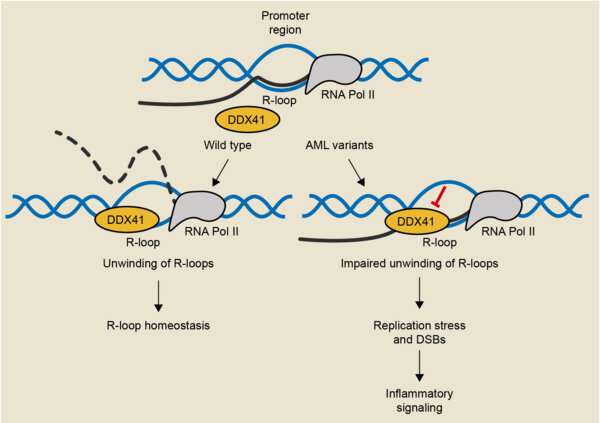Link between excessive R-loop levels and DNA damage to be a potential cause of disease

There are many ways in which the genetic material DNA can be damaged, resulting in the development of diseases such as cancer. Certain forms of DNA damage are associated with so-called R-loops. These are three-stranded structures consisting of two DNA strands and one RNA strand, whereby one of the DNA strands forms the loop. The level of R-loops needs to be strictly regulated to avoid genomic instability and consequent damage. Researchers at the Institute of Molecular Biology (IMB) in Mainz have developed a new method that has allowed them to identify the proteins in the proximity of R-loops in human cells. They discovered that a tumor suppressor protein called DDX41 is responsible for preventing R-loops from building up in cells and that this is an important mechanism for preventing genomic instability and subsequent disease. The results were published in Nature Communications.
Levels of R-loops need to be balanced
Our DNA contains all the information necessary for cells to function. It normally exists as a double-stranded helix. So-called R-loops are structures formed when an RNA strand binds to one of the two DNA strands, causing the other DNA strand to form a single-stranded "loop." These R-loops are important for regulating gene transcription but unfortunately also increase the risk of DNA damage, which can in turn result in genomic instability and lead to cancer.
To find out how cells balance R-loop formation to permit transcription while also minimizing the risk of DNA damage, a team of researchers at IMB developed a new method called RNA-DNA proximity (RDPRox) proteomics to screen for proteins that associate with R-loops. This allowed them to identify proteins that may be responsible for regulating R-loop levels in human cells.
The researchers identified a protein called DDX41, which is frequently mutated in patients with myelodysplastic syndrome and acute myeloid leukemia. When the team experimentally reduced DDX41 protein levels, they found a dramatic increase in R-loops and double-strand breaks (DSBs) in the cells' DNA, suggesting that DDX41 is responsible for keeping R-loop levels down. Further analysis showed that this increase in R-loops primarily occurred at the promoters of highly expressed genes and that many promoters with increased R-loops also showed an increase in DSBs.
The researchers, including Professor Petra Beli and Professor Brian Luke, both heads of research groups at IMB and professors at the Institute of Developmental Biology and Neurobiology at Johannes Gutenberg University Mainz (JGU), assume that the accumulated R-loops in DDX41 mutant cells may interfere with DNA replication or transcription, thereby increasing the risk of double-strand breaks leading to cancer. "By identifying proteins that are proximal to R-loops in human cells, we showed for the first time that sites of R-loop accumulation coincide with sites of increased DNA fragility," explained Professor Petra Beli, the lead scientist in the project. To date, 612 proteins of this kind have been found. "We propose that R-loop accumulation and genomic instability-associated inflammatory response may contribute to the development of familial AML with mutated DDX41," write the authors in their contribution to Nature Communications. These findings may also open new therapeutic strategies to treat cancer by inhibiting DNA repair proteins.
More information: Thorsten Mosler et al, R-loop proximity proteomics identifies a role of DDX41 in transcription-associated genomic instability, Nature Communications (2021). DOI: 10.1038/s41467-021-27530-y
Journal information: Nature Communications
Provided by Universitaet Mainz




















